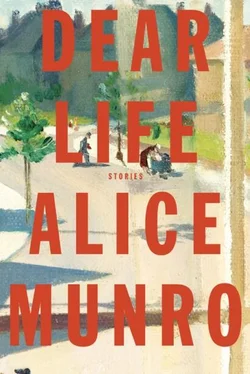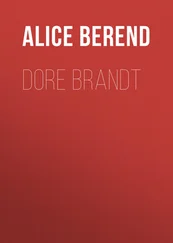That was why they were now waving and waving from the platform and from the train.
There was a magazine then, called The Echo Answers , published irregularly in Toronto. Greta had found it in the library and sent them some poems. Two of the poems had been published, and the result was that when the editor of the magazine came to Vancouver, last fall, she had been invited to a party, with other writers, to meet him. The party was at the house of a writer whose name had been familiar to her, it seemed, for her whole life. It was held in the late afternoon, when Peter was still at work, so she hired a sitter and set off on the North Vancouver bus across Lions Gate Bridge and through Stanley Park. Then she had to wait in front of the Hudson’s Bay for a long ride out to the university campus, which was where the writer lived. Let off at the bus’s last turning, she found the street and walked along peering at house numbers. She was wearing high heels which slowed her down considerably. Also her most sophisticated black dress, zipped up at the back and skimming the waist and always a little too tight at the hips. It made her look somewhat ridiculous, she thought, as she stumbled slightly, along the curving streets with no sidewalks, the only person about in the waning afternoon. Modern houses, picture windows, as in any up-and-coming suburb, not at all the kind of neighborhood she had expected. She was beginning to wonder if she had got the street wrong, and was not unhappy to think that. She could go back to the bus stop where there was a bench. She could slip off her shoes and settle down for the long solitary ride home.
But when she saw the cars parked, saw the number, it was too late to turn around. Noise seeped out around the closed door and she had to ring the bell twice.
She was greeted by a woman who seemed to have been expecting somebody else. Greeted was the wrong word—the woman opened the door and Greta said that this must be where they were having the party.
“What does it look like?” the woman said, and leaned on the doorframe. The way was barred till she—Greta—said, “May I come in?” and then there was a movement that seemed to cause considerable pain. She didn’t ask Greta to follow her but Greta did anyway.
Nobody spoke to her or noticed her but in a short time a teenage girl thrust out a tray on which there were glasses of what looked like pink lemonade. Greta took one, and drank it down at a thirsty gulp, then took another. She thanked the girl, and tried to start a conversation about the long hot walk, but the girl was not interested and turned away, doing her job.
Greta moved on. She kept smiling. Nobody looked at her with any recognition or pleasure and why should they? People’s eyes slid round her and then they went on with their conversations. They laughed. Everybody but Greta was equipped with friends, jokes, half-secrets, everybody appeared to have found somebody to welcome them. Except for the teenagers who kept sullenly relentlessly passing their pink drinks.
She didn’t give up, though. The drink was helping her and she resolved to have another as soon as the tray came around. She watched for a conversational group that seemed to have a hole in it, where she might insert herself. She seemed to have found one when she heard the names of movies mentioned. European movies, such as were beginning to be shown in Vancouver at that time. She heard the name of one that she and Peter had gone to see. The Four Hundred Blows . “Oh, I saw that.” She said this loudly and enthusiastically, and they all looked at her and one, a spokesperson evidently, said, “Really?”
Greta was drunk, of course. Pimm’s No. 1 and pink grapefruit juice downed in a hurry. She didn’t take this snub to heart as she might have done in a normal way. Just drifted on, knowing she had somehow lost her bearings but getting a feeling that there was a giddy atmosphere of permission in the room, and it didn’t matter about not making friends, she could just wander around and pass her own judgments.
There was a knot of people in an archway who were important. She saw among them the host, the writer whose name and face she had known for such a long time. His conversation was loud and hectic and there seemed to be danger around him and a couple of other men, as if they would as soon fire off an insult as look at you. Their wives, she came to believe, made up the circle she had tried to crash into.
The woman who had answered the door was not one of either group, being a writer herself. Greta saw her turn when her name was called. It was the name of a contributor to the magazine in which she herself had been published. On these grounds, might it not be possible to go up and introduce herself? An equal, in spite of the coolness at the door?
But now the woman had her head lolling on the shoulder of the man who had called her name, and they would not welcome an interruption.
This reflection made Greta sit down, and since there were no chairs she sat on the floor. She had a thought. She thought that when she went with Peter to an engineers’ party, the atmosphere was pleasant though the talk was boring. That was because everybody had their importance fixed and settled at least for the time being. Here nobody was safe. Judgment might be passed behind backs, even on the known and published. An air of cleverness or nerves obtained, no matter who you were.
And here she had been desperate for anybody to throw her any old bone of conversation at all.
When she got her theory of the unpleasantness worked out she felt relieved and didn’t much care if anybody talked to her or not. She took her shoes off and the relief was immense. She sat with her back against a wall and her legs stuck out on one of the lesser of the party’s thoroughfares. She didn’t want to risk spilling her drink on the rug so she finished it in a hurry.
A man stood over her. He said, “How did you get here?”
She pitied his dull clumping feet. She pitied anybody who had to stand up.
She said that she had been invited.
“Yes. But did you come in your car?”
“I walked.” But that was not enough, and in a while she managed to offer up the rest of it.
“I came on a bus, then I walked.”
One of the men who had been in the special circle was now behind the man in the shoes. He said, “Excellent idea.” He actually seemed ready to talk to her.
The first man didn’t care for this one so much. He had retrieved Greta’s shoes, but she refused them, explaining that they hurt too much.
“Carry them. Or I will. Can you get up?”
She looked for the more important man to help her, but he wasn’t there. Now she remembered what he’d written. A play about Doukhobors that had caused a big row because the Doukhobors were going to have to be naked. Of course they weren’t real Doukhobors, they were actors. And they were not allowed to be naked after all.
She tried explaining this to the man who helped her up, but he was plainly not interested. She asked what he wrote. He said he was not that kind of writer, he was a journalist. Visiting in this house with his son and daughter, grandchildren of the hosts. They—the children—had been passing out the drinks.
“Lethal,” he said, referring to the drinks. “Criminal.”
Now they were outside. She walked in her stocking feet across the grass, barely avoiding a puddle.
“Somebody has thrown up there,” she told her escort.
“Indeed,” he said, and settled her into a car. The outside air had altered her mood, from an unsettled elation to something within reach of embarrassment, even shame.
“North Vancouver,” he said. She must have told him that. “Okay? We’ll proceed. The Lions Gate.”
She hoped he wouldn’t ask what she was doing at the party. If she had to say she was a poet, her present situation, her overindulgence, would be taken as drearily typical. It wasn’t dark out, but it was evening. They seemed to be headed in the right direction, along some water then over a bridge. The Burrard Street bridge. Then more traffic, she kept opening her eyes to trees passing by, then shutting them again without meaning to. She knew when the car stopped that it was too soon for them to be home. That is, at her home.
Читать дальше












